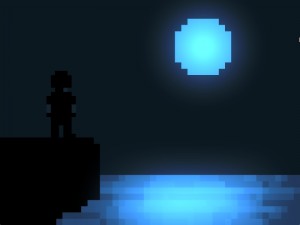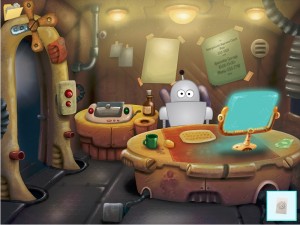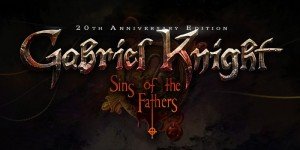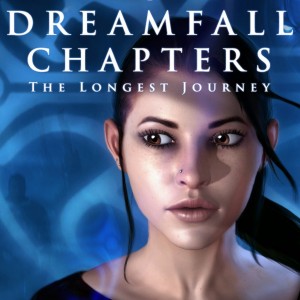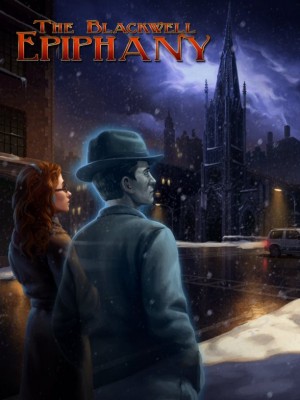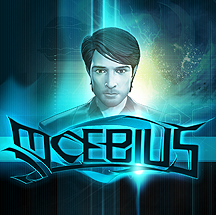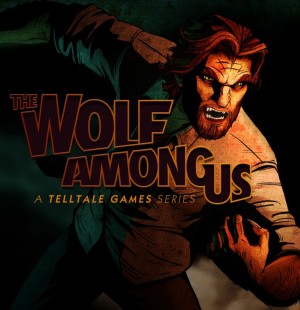Following Freeware - January 2015 releases page 2
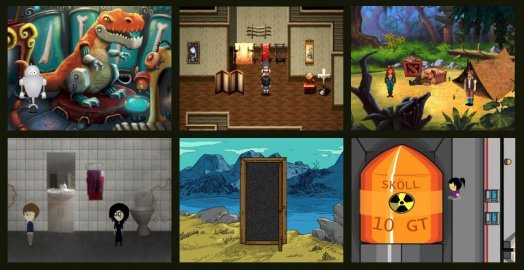
This month you can travel to the depths of the jungle, to a surrealistic version of hell, or even into parallel worlds. Those who like to work to deadlines can take a handful of days to evade a deadly spirit, or a mere sixty seconds to prevent a spaceship exploding. Alternatively, you could join a robot detective on a hunt for missing cows, or a scientist literally working in the dark. All these await you in this month’s round-up of releases from the freeware scene.
Willem's Winners
Abandoned
Your brother was always interested in parallel worlds. After many years of research, he has suddenly disappeared. You get a letter from him in which he explains that he has finally found the doors to parallel worlds and is going to explore what is on the other side of them. Deciding to follow him to see if he is safe, you soon find yourself in a silent, abandoned world. While investigating this world, you find notes written by your brother scattered about which help you along.
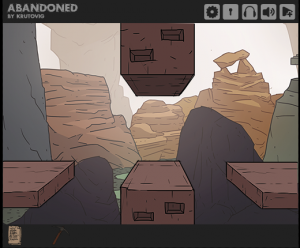 Abandoned, by Krutovig, is the first part of a planned series. The environment here is presented in an unusual first-person perspective: as the player you're almost never exactly in the same position as the protagonist but you never see him/her on screen either. The static screens are simple but beautiful, drawn in subdued colors in a realistic style with just enough detail to see most of the things you need clearly. There is one puzzle that involves clicking on a very tiny button that is hardly visible, however. After entering the parallel world you’ll find yourself in an abandoned mine, but soon you will be crawling through metal tubes, walking on floating stone beams and solving a very complicated puzzle inside a pyramid. There is no voice work, and apart from your brother's letters no text is displayed in this game. Eerie electronic music plays in the background, and many sound effects can be heard, like your footsteps, the clicking of switches and sounds of machinery.
Abandoned, by Krutovig, is the first part of a planned series. The environment here is presented in an unusual first-person perspective: as the player you're almost never exactly in the same position as the protagonist but you never see him/her on screen either. The static screens are simple but beautiful, drawn in subdued colors in a realistic style with just enough detail to see most of the things you need clearly. There is one puzzle that involves clicking on a very tiny button that is hardly visible, however. After entering the parallel world you’ll find yourself in an abandoned mine, but soon you will be crawling through metal tubes, walking on floating stone beams and solving a very complicated puzzle inside a pyramid. There is no voice work, and apart from your brother's letters no text is displayed in this game. Eerie electronic music plays in the background, and many sound effects can be heard, like your footsteps, the clicking of switches and sounds of machinery.
Only the left mouse button is used to interact with the game, and the inventory is displayed in a bar at the lower part of the screen. The puzzles are quite hard: apart from getting and using the right tools for certain jobs, most puzzles require thinking about how the world has been shaped by the people who built it and determining how the things you find are related to one another. You also need to search for codes to open doors and the like. But even the most difficult puzzles are logical and fun to solve. Playing the game will likely remind you of Myst, though this is hardly a Myst clone but a game that has its own distinctive style and atmosphere. It's a great game for fans of exploring mysterious worlds and solving challenging puzzles on the way. Hopefully we will see the second part soon.
Abandoned can be played online on Kongregate.
A Night That Wouldn't End
Finally, after months of toiling in the darkness on the island where you are stationed near the North Pole, the end of your research project is in sight. You only have to do one more experiment before you can take a long vacation. Unfortunately, the power in your remote station has gone down. Cursing the darkness, your job, and your life (you know how it is), you head outside to check the lunar panels. But before you can get the panels working again you need to open a stuck drawer, charge a flashlight and open a hatch. Hopefully then you can finally do your experiment and go home!
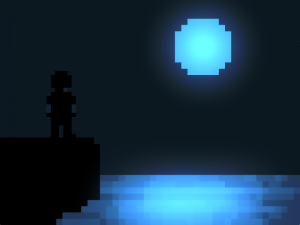 LostTrainDude’s short game A Night That Wouldn't End, developed for the December 2014 MAGS competition, features ‘needlessly big chunky pixels’ in the words of its own developer. And indeed, the game world is made up of enormous pixels, though in this endless night they can be very hard to see in the dark. The darkness does a lot for the atmosphere, however, and helps convey the commitment of the scientist who toils in these conditions just to satisfy his curiosity and add to the pool of human knowledge. Playing at various intervals are randomly-selected piano and string chords, which could have been problematic but work quite well thanks to the sounds the developer chose. Besides the soundtrack, you’ll also hear the hiss of the sea and the wind, the sound of the waves hitting the coast, and human noises like the clicking of switches and the sound of sticky tape pulled off its roll. Both dialogue and thoughts are shown as text on screen.
LostTrainDude’s short game A Night That Wouldn't End, developed for the December 2014 MAGS competition, features ‘needlessly big chunky pixels’ in the words of its own developer. And indeed, the game world is made up of enormous pixels, though in this endless night they can be very hard to see in the dark. The darkness does a lot for the atmosphere, however, and helps convey the commitment of the scientist who toils in these conditions just to satisfy his curiosity and add to the pool of human knowledge. Playing at various intervals are randomly-selected piano and string chords, which could have been problematic but work quite well thanks to the sounds the developer chose. Besides the soundtrack, you’ll also hear the hiss of the sea and the wind, the sound of the waves hitting the coast, and human noises like the clicking of switches and the sound of sticky tape pulled off its roll. Both dialogue and thoughts are shown as text on screen.
Right-clicking an object gives you a description of it, and left-clicking makes you interact with it. The inventory can be found by moving the cursor to the top of the screen. The puzzles, most of them inventory-based, are quite simple and will hardly pose a challenge. The problem is that because it's so dark, you can barely see anything and will have to do a bit of pixel hunting to find every object you need. The developers built in a gamma adjustment panel, but it didn't work on my computer. Fortunately, I was still able to finish the game without significant problems by turning my screen brightness to maximum. The short play time, excessive darkness, and blocky pixels are all overcome by the game’s very human protagonist, whose thoughts and feelings are conveyed in a truly natural way, making A Night That Wouldn't End a satisfying experience overall.
A Night That Wouldn't End can be downloaded from the AGS website.
Faye King: Jungle Jeopardy
Faye King, pilot for hire, is having a bad day. When her plane malfunctions she crashes in the middle of the jungle. She survives the accident unscathed, but her passenger is unconscious. Faye searches the surroundings near the crash site for help and soon finds a parrot who speaks of a certain Jungle Bob. Faye decides to find this man and ask him for help, but her search for Bob is long and hard: she has to buy a souvenir in a small shop for a tourist, catch a butterfly for a biologist, and even persuade a tiger on a narrow path in the jungle to move out of her way in order to find Bob and get him to help her.
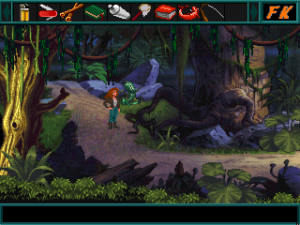 Faye King: Jungle Jeopardy is Two Tale Entertainment's first title. It's presented in third-person perspective and instead of drawing most of the pixel art themselves, the developers have used many backgrounds and sprites from other games. (A fact clearly admitted at the start of the game, with full credit given for all assets used at the end.) For instance, Faye’s model is Sophia Hapgood from Fate of Atlantis, while the souvenir you get for the tourist looks a lot like a certain statuette from Monkey Island and the shop where you buy the souvenir will remind players instantly of Flight of the Amazon Queen. Birds and insects flying about add an extra feeling of immersion, and you are surrounded by sounds from the jungle, like the rustling of leaves, tweeting of birds and the rush of a waterfall. The game has no voice acting so all text is displayed in the font that LucasArts used for many of its games.
Faye King: Jungle Jeopardy is Two Tale Entertainment's first title. It's presented in third-person perspective and instead of drawing most of the pixel art themselves, the developers have used many backgrounds and sprites from other games. (A fact clearly admitted at the start of the game, with full credit given for all assets used at the end.) For instance, Faye’s model is Sophia Hapgood from Fate of Atlantis, while the souvenir you get for the tourist looks a lot like a certain statuette from Monkey Island and the shop where you buy the souvenir will remind players instantly of Flight of the Amazon Queen. Birds and insects flying about add an extra feeling of immersion, and you are surrounded by sounds from the jungle, like the rustling of leaves, tweeting of birds and the rush of a waterfall. The game has no voice acting so all text is displayed in the font that LucasArts used for many of its games.
Faye is controlled by the mouse. Right-clicking an object makes her describe it if she deems it necessary; left-clicking makes her interact with it. The inventory appears in a bar at the top of the screen. The ripped graphics can make the game feel like an interesting trip down memory lane for fans of the old 1990s classics, but it’s also worth playing for its own sake. Although Faye has a lot of fetch quests to perform, which gets a bit boring after a while from all the walking through the jungle, the mainly inventory-based puzzles are often interesting and always logical, and sometimes funny solutions present themselves. It's a pity that some screens contain many interesting objects Faye has nothing to say about, but overall Faye King: Jungle Jeopardy is a very nice game, particularly for a first attempt.
Faye King: Jungle Jeopardy can be downloaded from Two Tales' website.
Space on the Case
Space is a robot who runs his (its?) own detective business. One day he gets a message that Maud's cows have been stolen. They could be anywhere in the galaxy, but Space manages to learn that the cows are at a farm on Celery's planet. To get them back, all he has to do is to make himself smell like a dinosaur and get a wheel for an electric wheelchair, among other strange tasks.
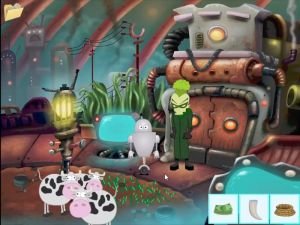 Space on the Case is made by the prolific Carmel Games. This time around the developers have upgraded their graphics, which are now more detailed and have gradient colors. Where the old cartoon drawings consisted of many crooked lines, the artwork is now much smoother, which gives it a more polished look. The world Space lives in seems like it came from a 1950s movie. Strange aliens have big heads, and most objects have rounded, organic shapes and colors. As usual, the voice acting is excellent, and the spoken text still appears in oblong boxes on screen in one of the seven languages you can choose from at the beginning of the game. Soft electronic music plays in the background, while the few sound effects like the rustling of money and the sound of machinery are accurate and fit the game well.
Space on the Case is made by the prolific Carmel Games. This time around the developers have upgraded their graphics, which are now more detailed and have gradient colors. Where the old cartoon drawings consisted of many crooked lines, the artwork is now much smoother, which gives it a more polished look. The world Space lives in seems like it came from a 1950s movie. Strange aliens have big heads, and most objects have rounded, organic shapes and colors. As usual, the voice acting is excellent, and the spoken text still appears in oblong boxes on screen in one of the seven languages you can choose from at the beginning of the game. Soft electronic music plays in the background, while the few sound effects like the rustling of money and the sound of machinery are accurate and fit the game well.
Space on the Case is very short, even for a Carmel Games adventure, and the puzzles are similar to what we've come to expect: there is a fetch quest, a tiled jigsaw, some inventory puzzles, and you have to make smart use of the things you find. Nothing out of the ordinary here. The same is true of the interface: the game is played using only the left mouse button, and the inventory is located in the lower right part of the screen. The usual wackiness of Carmel's games is also still present. There are some funny jokes and the robot itself looks like it's going to topple over any minute because of its big torso supported by only one wheel. You'll meet some characters in this game that I would like to see again in longer games, like Celery and the robot barman, and overall Space on the Case is a short but fun diversion.
Space on the Case can be played online at JayisGames.
Steve's Selections
You.Me.Hell
Tova lives in a state of almost constant rage. Her partner Tor is laid-back as a man could be. Little wonder that there is a certain amount of tension in their relationship from time to time. Now they both appear to be in hell, reliving past events in their relationship. But was the computer always so cranky, and did Tor really go to such lengths to hook up with Tova in the first place? As each experiences different parts of their history together, the real world and the infernal realm start to blur into one another. Can this really be their fate?
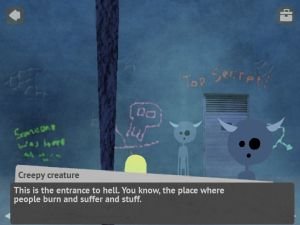 Biscuit Placebo’s latest offering is another slice of the decidedly surreal. The graphics are done in the collage style of their previous game, with characters especially appearing to be made of basic cut-outs. Despite the simplicity of the look, expressive eyes and mouths help bring the characters to life. You commence your quest in the rocky caves that form the outskirts of Hell, but your quest will take you to the couple’s mundane apartment, as well as a disco party where they first met. Conversations produce slightly more detailed close-ups, though the dialogue is unvoiced. These can include some bizarre imagery, such as a man with a toadstool growing out of his head. The opening scene has a jazzy song about Hell as background. Other scenes include location-appropriate music, such as the disco.
Biscuit Placebo’s latest offering is another slice of the decidedly surreal. The graphics are done in the collage style of their previous game, with characters especially appearing to be made of basic cut-outs. Despite the simplicity of the look, expressive eyes and mouths help bring the characters to life. You commence your quest in the rocky caves that form the outskirts of Hell, but your quest will take you to the couple’s mundane apartment, as well as a disco party where they first met. Conversations produce slightly more detailed close-ups, though the dialogue is unvoiced. These can include some bizarre imagery, such as a man with a toadstool growing out of his head. The opening scene has a jazzy song about Hell as background. Other scenes include location-appropriate music, such as the disco.
Whilst maintaining some semblance of internal logic, this is a decidedly peculiar game. Sections alternate between you controlling Tova and Tor in different situations. For each, simple point-and-click controls allow you to move and interact. Where more than one interaction is possible at a hotspot, a list of options is presented. These include use of an inventory item when appropriate. You will face such tasks as operating a remote controlled coffee machine and driving away a collection of love rivals. There are some devious combinations to decipher, as well as some deceptively complex dialogue challenges. Some puzzles require you to fully appreciate the game’s skewed take on reality, with a twisted sense of humour running throughout your adventure.
You.Me.Hell. can be downloaded from the developer’s website. Versions are available for PC, Mac and Linux, as well as iOS and Android devices.
Follow the Darkness
They say that when you commit a great sin, the Fox God starts following you. It pursues you for seven days, and if you don’t atone for your sin in that time, you die. For Rina Kozuki, this urban legend seems to be all too real, as she finds herself watched by a figure in a fox mask only she can see. But, even believing in the curse, Rina finds herself unable to lift it. Three of her seven days have been lost in a coma, and she has awoken with no memory of the great sin she has committed. To atone for her sins, Rina must reconstruct her last movements and uncover her own crime. But with the Fox God chasing ever closer, and another spirit wishing her harm, Rina is rapidly running out of time.
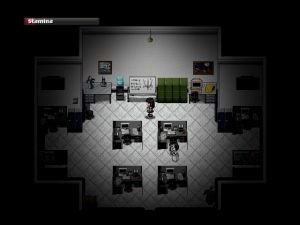 AtlasAtrium has created a decidedly unnerving game inspired by Japanese mythology. Presentation is done in a top-down RPG-style look with a decent amount of detail to the backgrounds. Home settings are pleasantly furnished with such items as paper screen dividers, whilst an abandoned factory is full of rusting storage lockers. There is also good use of shading to give the scenery depth. Characters are distinctively styled so individuals can be identified at a glance. There are also nice atmospheric effects, like faulty lights sparking sporadically. In dark locations, the environment is only visible in the player character’s immediate vicinity, fading to black a short distance away. Background music is a traditional Japanese style, fitting the setting. There are also suitable sound effects, including the laboured breathing of the protagonist as she falls prey to the horrors besetting her. This is the only vocal performance, with the dialogue being text-only.
AtlasAtrium has created a decidedly unnerving game inspired by Japanese mythology. Presentation is done in a top-down RPG-style look with a decent amount of detail to the backgrounds. Home settings are pleasantly furnished with such items as paper screen dividers, whilst an abandoned factory is full of rusting storage lockers. There is also good use of shading to give the scenery depth. Characters are distinctively styled so individuals can be identified at a glance. There are also nice atmospheric effects, like faulty lights sparking sporadically. In dark locations, the environment is only visible in the player character’s immediate vicinity, fading to black a short distance away. Background music is a traditional Japanese style, fitting the setting. There are also suitable sound effects, including the laboured breathing of the protagonist as she falls prey to the horrors besetting her. This is the only vocal performance, with the dialogue being text-only.
This is not a game for the fainthearted, including both jump scares and more psychological horror. Controls are handled by keyboard, with the arrow keys to move around and the spacebar to interact. X calls up a menu where you can save the game and review both the items and information you discover on the way. Holding the Shift key allows you to run, though you can only do so in short bursts before your stamina runs out. As the game progresses, you will need to do this from time to time, as both the Fox God and another spirit actively pursue you. Exploration is the key to resolving the mystery of your great sin as you return to locations you visited in the days leading up to your hospital stay. A small amount of inventory sees direct practical use, and you must also manipulate some machinery and solve a riddle. You can be killed by the spirits that pursue you, but they need to catch you multiple times to do this. The damage you suffer is represented by a bloody overlay that starts faded and becomes more sharply defined as you take more hits. The lead character’s breathing also becomes more laboured. Fortunately you recover from damage relatively quickly if you can evade them for a short period. The game also prompts you to save when you are entering a dangerous section.
Follow the Darkness can be downloaded from the RPG Maker website.
We Are All Going to Die
On a mission in deep space, you wake to find that someone has set the self-destruct and you only have a minute to live. You rush round trying to rectify the problem, but sixty seconds is not enough time. Fortunately, as time runs out and the ship explodes, a strange thing happens. You find yourself hurled back in time to the moment you realised the self-destruct was active. Living the same minute over and over again, you struggle to find a way to save the ship… but is it worth saving?
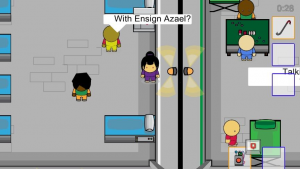 Brwarner Studios have produced a sci-fi game that packs in a lot more than its 60-second play time would suggest. The graphics use a top-down RPG style and are fairly simplistic in look. The bulk of the ship consists of clean white corridors interspersed with grey automatic doors. Individual rooms have more detail, including a poker table in the mess hall and a huge warhead in the central bomb bay. Characters are also fairly simplistic in nature, though clothing colour and hairstyle go some way in distinguishing them. A basic running animation is used for people moving about, and a tonal sci-fi piece forms the background to the action. There are also sound effects, including voiced warnings about the self-destruct from the computer and a loud siren in the closing seconds.
Brwarner Studios have produced a sci-fi game that packs in a lot more than its 60-second play time would suggest. The graphics use a top-down RPG style and are fairly simplistic in look. The bulk of the ship consists of clean white corridors interspersed with grey automatic doors. Individual rooms have more detail, including a poker table in the mess hall and a huge warhead in the central bomb bay. Characters are also fairly simplistic in nature, though clothing colour and hairstyle go some way in distinguishing them. A basic running animation is used for people moving about, and a tonal sci-fi piece forms the background to the action. There are also sound effects, including voiced warnings about the self-destruct from the computer and a loud siren in the closing seconds.
A single playthrough will not be enough to complete this game. Using the WASD keys to move around the ship, most doors open automatically as you approach them. When you get close to other characters, text dialogues are displayed. Some of these are addressed to you directly and some are conversations the character is having with others. These allow you to piece together the backstory of the game, as well as occasionally providing you with clues to aid your quest. Two of the doors you’ll encounter are locked. Approaching these opens a small password interface for you to type the password. Keeping a pen and paper at hand may be advisable, as on-screen reminders of passwords disappear when the clock resets. A handful of items can also be collected, with all but one used automatically when appropriate. The Q key allows you to reset time immediately, while E allows an additional action only possible when you have completed a certain task.
We Are All Going to Die can be played online at JayIsGames.
Other new releases
Not all games are created equal, and freeware games especially come in all shapes and sizes. Not to be overlooked, the following list might also be of interest, though these games may be significantly shorter or less polished, more experimental titles than those detailed above, some perhaps only borderline adventures to begin with.
Saving Zoey by kaleidofish – A trip to a haunted house attraction with your little sister proves more horrific than expected in this gruesome visual novel.
Moving Stories by Terry Cavanagh and Stephen Lavelle – What you choose to pack when moving can tell the story of your life.
Break the Limits! by StormAlligator – Trapped inside your own head, can you find a way to break the limits?
Presentable Liberty by Wertpol – Experience the end of humanity from your prison cell in this gripping interactive story.
Providence by SeamanNaranja – Discover the common destiny of three people in this strange interactive short story.
Hawk Eye Quandaries by ReVenture Games – Help the teen twins Josie and Justin Hawk solve crimes in their neighbourhood.
That’s it for this month. Think we’ve missed a gem or want to tell us about your own game? Then pop in to our Adventure forum and tell us about it!
Stephen Brown and Willem Tjerkstra contributed to this article.




